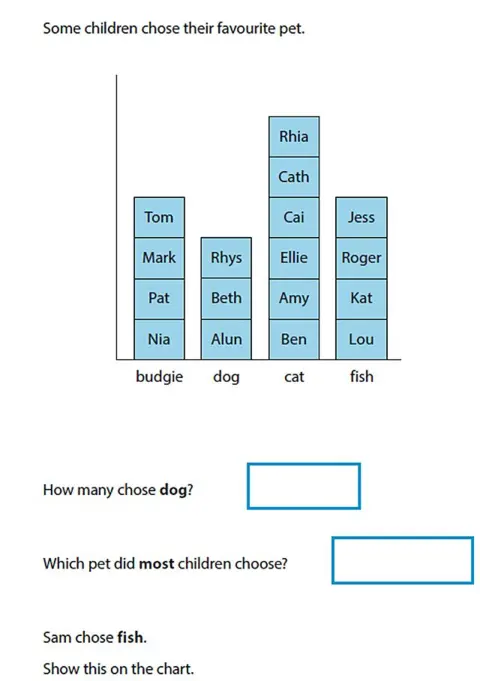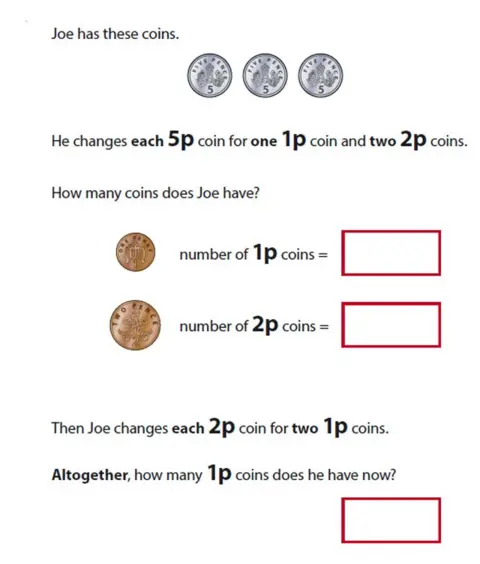School test pressure worries for six and seven-year-olds
 Highwaystarz/Getty Images
Highwaystarz/Getty ImagesThere needs to be a "really good look" at the purpose of school tests for six and seven-year-olds in Wales, the children's commissioner has said.
Sally Holland said she hoped moving the assessments online would reduce the pressure on pupils.
But she admitted she was "surprised" worries over tests were the top concern in a recent survey of 7,000 pupils.
The Welsh Government said new assessments would give schools flexibility over when to schedule them.
Pupils from years 2 to 6 are taking national reading and numeracy tests this week, after tests for year 7 to 9 pupils in secondary schools began last week.
But is there too much pressure on young children?
A survey of 6,902 seven to 11-year-olds for the commissioner's office found tests were their biggest worry, ahead of bullying.
"It's hard to know whether the children were feeling the pressure from the school, from their parents or perhaps even from other children," said Ms Holland.
She said it could have an impact on confidence and self-esteem.
"I had a head teacher say to me that she had a little girl say to her 'there's no point me sitting these tests because it's just going to show me again how rubbish I am'," said Ms Holland.
"And I found that really sad and the head teacher found it really sad because she knows where that individual child is academically and doesn't need that external pressure on the child for her or the child to know that."
Ms Holland said the mother of a newly-turned seven-year-old told her that for the first time her child did not want to go to school because of a test.
"That seems a shame when education at that age should be about the pure enjoyment and fun of learning," she said.
The commissioner said it was important we know clearly what the purpose of tests are - and questioned if they should be introduced so early.
"I'm not convinced that six or seven-year-olds need to be practising for external exams - just dealing with every day knocks, of school and friendships and learning itself," she added.
A short history of tests in Wales
- The National Reading and Numeracy tests were introduced in 2013, after standard attainment tests (SATs) were ditched a decade earlier. The then Education Minister Leighton Andrews was concerned the Welsh Government had taken its "eye off the ball" when it came to school standards, leading to poor results in international Pisa tests.
- Since then there has been a move away from presenting tests as a way to measure schools, placing a greater emphasis on the tests as a way of tracking individual pupils' progress and informing the next steps in their learning.
- In 2018 the Welsh Government stopped publishing schools' results in comparison with others in the area, though a school's data is still available to parents as well as their child's results.
- Personalised online tests are being introduced from this year - tailored to individual pupils.

Heidi Seage's eldest daughter Poppy is taking her national reading and maths tests and she is not convinced the age of seven is the right age for formal testing.
Ms Seage is a lecturer and used to working with stressed students but did not expect seven-year-olds to have worries.
"I was surprised how worried she was last week - I thought they wouldn't be a big deal and she'd just breeze through them. She was concerned about working on her own and being in the test environment.
"But she's come out of school today beaming and saying how much she's enjoyed the experience of the tests. But it's definitely affected her well-being.
"The school has put no pressures on the children at all and I haven't put pressure on myself - we haven't really raised the topic, But I think she knows the word 'tests' and that they're going to be compared against others and I think they're worried if they can't do certain things it will reflect on them badly.
"It's hard to explain to a seven-year-old you can't be perfect and you will make mistakes."
Poppy said: "Before the test was on I was worried but after I felt better. Doing it was easier than thinking about getting things wrong."

Testing your numeracy and reasoning - five sample questions for year 2:
1.

2. Pens are 20p each. Tom buys six pens. He pays with a £2 coin. How much change does Tom get?
3. What are 28 + 7 = and 17 - 9 =
4.

5. One car and one ball cost 70p. Two balls cost 40p. How much for three cars?
Source: Welsh Government. Answers are at the bottom.

The Welsh Government said its guidance was clear that pupils should not be worried or anxious about taking them.
"In preparation for the new curriculum, we are already introducing online personalised assessments to replace the traditional paper-based reading and numeracy tests," said a spokesman.
"These assessments provide a tailored, interactive experience to engage learners and assess their skills, the things they may need to work on, and their next steps. Schools have the flexibility to decide when to schedule them in order to help plan their teaching and learning."
Answers to the test: 1) Three chose dog; cat; child adds one block to the 'fish' column. 2) Tom gets 80p change. 3) 35 and eight. 4) Joe has three, six and 15 coins. 5) Three cars would cost 150p or £1.50
